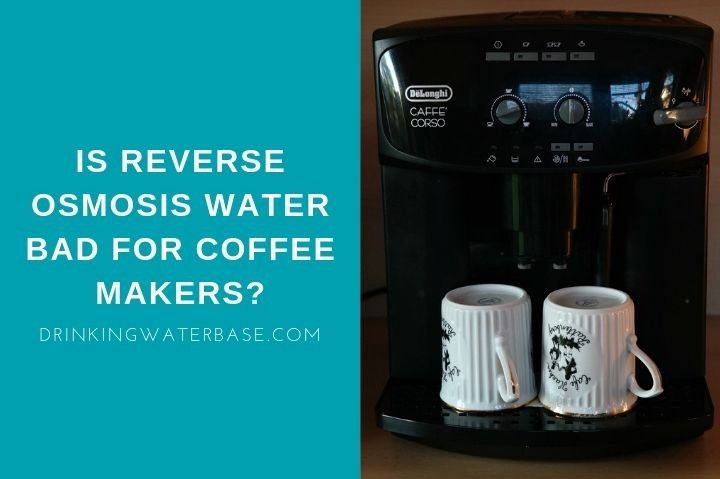I need to confess, I am a massive fan of a good cup of coffee. Especially when I am writing, I feel like the smell of coffee boosts my creativity.
This passion has led me to this topic as many households today use reverse osmosis treatment method, but is reverse osmosis water bad for coffee machines and drink itself? I will talk about this in more detail but in short:
Reverse osmosis produces slightly acidic water which could damage coffee machine over time. The pH level of RO water would take a very long time to do significant damage to the coffee maker. If you live in an area with hard water, chances area that damage caused by it will appear sooner.
This is that brief summary, and if you want to understand this more in depth, I would be happy if you stick around.
Before we get to a coffee part, I would like to briefly explain the way reverse osmosis works, because it will allow you to understand better how I have made conclusions.
I think it is essential to know as there are two groups of people currently, one that loves coffee with RO treated water, and the other that says RO is terrible for coffee.
Without any ado, let’s get to the point!
How Does Reverse Osmosis Treatment Work
The reverse osmosis is the most advanced filtration technology at the moment. RO filters usually have 3-7 stages. The standard systems have five stages and you can get additional remineralization stage and UV purification stage.
First two to three stages are similar amongst most types of filters. They work as the pre-treatment of water before an actual reverse osmosis membrane. These are usually made of carbon or coconut shell filters.
Now, we are getting to the most critical part – reverse osmosis membrane.
The membrane contains thousands of micro-pores that have a size of about 0.0001 microns. This is just big enough for molecules of water to pass through, and everything else is rejected.
Because of this, there are a lot of wastewater generated and just flushed the drain, however, the purity of water on the other side of the membrane is exceptionally high.
The bottom line is:
Reverse osmosis water removes up to 99% of contaminants, including healthy minerals such as calcium, potassium, and magnesium. Remember these three minerals as they are essential, and I will get back to them in a minute.
In a nutshell, purified water from the RO filter is very close to distilled water.
The only difference is that distilled water obliterates everything apart from water molecules, while RO water could still have very few impurities that are smaller than the RO membrane pores and were able to pass. Additionally, reverse osmosis slightly lowers the pH level of the water.
By now you should have a rough idea on how reverse osmosis filtration work, so let’s have a look what does everything said earlier mean for your coffee machine.
How Reverse Osmosis Water Impacts Espresso Makers
The truth is RO treated water is not going to damage your espresso maker in anyway but the acidic water it produces can over the extended period.
In reality, RO filtered water has a neutral pH of 7, however, once water is exposed to oxygen, the level of pH drops down to 6 – 5.
For this reason, I would like to talk about the actual impact of low pH water on your coffee maker.
The biggest problem with low pH water is that it is acidic. Acidic water can make your appliances, especially metal ones corrode, which over time will inevitably lead to leaks and damage.
Let’s be honest:
Espresso makers are expensive, so you want to ensure that water is not damaging them from the inside.
The slight acidity of water is not as near as bad as hard water that causes the limescale. This especially applies to people who live in the area with hard water, as it causes much more damage than the water of pH 5.
By the way, coffee has a pH of 4, so it is an acidic drink.
The bottom line is:
Reverse osmosis filters without the additional remineralization and alkalinization stage could potentially damage the coffee maker tank over a very long time due to water acidity.
If I am honest, I don’t think you would even have a coffee maker for such a long time, and the likelihood of hard water causing damage earlier is much bigger, of course, if you live in such region.
I hope it is clear what does the RO filter make with your espresso maker, but the biggest debate amongst coffee lovers is its impact on taste.
Reverse Osmosis Water Impact On a Coffee Taste
Okay, we said earlier that apart from all impurities RO filter also removes all the minerals you would like to keep in.
It is essential to understand that minerals mentioned earlier potassium sodium and magnesium, are vital from the perspective of how water affects the coffee flavor.
In essence, these minerals are responsible for how good does the water taste.
I know, I know – “Eugen, but water doesn’t have a taste!”
In that case, why do we like certain water and we don’t like the other?
The answer is, because of the different levels of these minerals. As simple as that. These are the same minerals that cause water hardness.
Now, having a great coffee blend is not enough for a good coffee, and if you want to have an unforgettable espresso experience, water plays a massive part in it.
In fact, there is even a guideline created by the Specialty Coffee Association. The association has pointed out the main characteristics of water that would ensure that you have the best beverage.
In short, water has to contain earlier said minerals like calcium and sodium, and the pH should be neutral – 7. If you want to read more about these standards – click here.
The bottom line:
You should definitely treat your water to protect the coffee machine but also improve your coffee break experiences. However, with reverse osmosis water is so easy to over process it because of the performance.
You still want to keep the useful minerals in water which gives two options. First is to get a remineralization stage for your RO filter.
The second option is to get a different filtration system, which I am going to cover in the next section.
Hint, no, you don’t have to spend a fortune on them.
Best Water For Coffee Machines and Taste
We know that for a great coffee flavor, a certain level of hardness is necessary as the same minerals that cause hardness also impact the taste.
On the other hand, you want to filter out impurities that hurt the coffee and in fact, on your health too.
How can you go about it?
Let me share with you what I have found as the best solution, in my opinion. The best water for coffee is filtered but not overly purified.
How can you achieve this? With the help of filters, but how to select the right one? Let me help you out.
When selecting a solution I have used the following criteria:
- Decent filtration capability
- Keeping minerals
- Reasonable price
The conclusion I have come to is that countertop filters are an excellent option.
These are not expensive, and at the same time, they remove a significant number of contaminants. Enough to make a perfect cup of coffee and keep your espresso maker running over time.
PS: Home Master is my favorite.
This is it for today’s article, and as you can see, it is never an easy answer, especially when it comes to filters.
For this reason, I encourage you to hang around and read my other articles as well as share your thoughts and feedback in the comment section below.
- Do you prefer RO treated water for your coffee or just filtered? Why?
- Have you seen a negative impact of RO water on your coffee machine?



Hello, My husband just installed an RO filter for our drinking water and now my coffee machine is acting up. It has been about 2 to 3 weeks. I am not sure what to do. What water should i be using or is there a coffee maker that i can use. I am freaking out..Morning routine is falling apart. lol